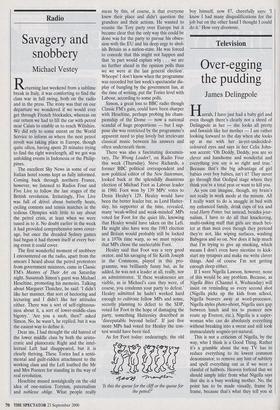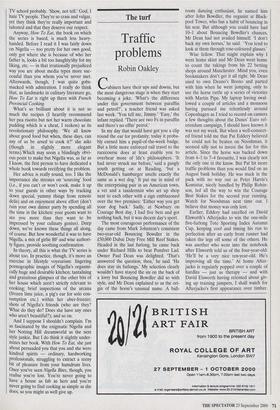Television
Over-egging the pudding
James Delingpole
Hurrah, I have just had a baby girl and even though there's clearly not a shred of Delingpole in her — she looks all pretty and fawnish like her mother — I am rather looking forward to the day when she looks up at me with her as-yet-undecided- coloured eyes and says in her Celia John- son accent: 'Oh Deddy, Deddy, you are so clever and handsome and wonderful and everything you say is so right and true.' Because that's the big advantage of girl babies over boy babies, isn't it? They never go through that Oedipal stage where they think you're a total prat or want to kill you.
As you can imagine, though, my brain's not really in work mode at the minute. All I really want to do is snuggle in bed with my enhanced family, drink cups of tea and read Harry Potter, but instead, besides jour- nalism, I have to do all that knackering, multi-tasking stuff that girls are much bet- ter at than men even though they pretend they're not, like wiping surfaces, washing Babygros and so on. Nor does it help much that I'm trying to give up smoking, which means I don't even have nicotine to kick- start my synapses and make me write clever things. And of course I'm not getting enough sleep either.
If I were Nigella Lawson, however, none of this would be any problem. Because, as Nigella Bites (Channel 4, Wednesday) will insist on reminding us every second shot (Nigella picks up the kids from school, Nigella beavers away at word-processor, Nigella styles photo-shoot, Nigella uses gap between lunch and tea to pioneer new route up Everest, etc.), Nigella is a super- woman who can do absolutely everything without breaking into a sweat and still look immaculately soignee-yet-natural.
This is not a criticism of Nigella, by the way, who I think is a Good Thing. Rather it's a grumble about the way TV has to reduce everything to its lowest common denominator; to remove any hint of subtlety and spell everything out as if we were a classful of halfwits. Heaven forfend that we should simply infer from what Nigella says that she is a busy working mother. No, the point has to be made visually, frame by frame, because that's what they tell you at TV school probably. 'Show, not tell.' God, I hate TV people. They're so crass and vulgar, yet they think they're really important and talented and that they deserve our respect.
Anyway, How To Eat, the book on which the series is based, is much less heavy- handed. Before I read it I was fairly down on Nigella — too pretty for her own good, only got where she is because of who her father is, looks a bit too haughty/shy for my liking, etc. — in that irrationally prejudiced way you are about media types more suc- cessful than you whom you've never met. Afterwards, though, I was quite gobs- macked with admiration. I really do think that, as landmarks in culinary literature go, How To Eat is right up there with French Provincial Cooking.
What's so brilliant about it is not so much the recipes (I heartily recommend her pea risotto but not her warm chocolate pudding which is a cheat, I reckon) as its revolutionary philosophy. `We all know about good food but when, these days, can any of us be arsed to cook it?' she asks (though in slightly more elegant terms).Which may seem a blindingly obvi- ous point to make but Nigella was, as far as I know, the first person to have dedicated a whole book towards rectifying the problem.
Her advice is really sound, too. I like the importance she stresses on 'sourcing' food (i.e., if you can't or won't cook, make it up to your guests in other ways by tracking down special, yummy things from remote delis) and on enjoyment above effort (don't ruin your own dinner party by spending all the time in the kitchen: your guests want to see you more than they want to be impressed by your culinary genius). Deep down, we've known these things all along, of course. But how wonderful it was to have Nigella, a mix of girlie BF and wise authori- ty figure, provide soothing confirmation.
In theory, all this is what the TV series is about too. In practice, though, it's more an exercise in lifestyle voyeurism: lingering pornographic images of Nigella's orgasmi- cally huge and desirable kitchen; tantalising and gratuitous glimpses of the other bits of her house which aren't strictly relevant to cooking; brief inspections of the arcana (frozen lime juice, a pig's ear for solo con- sumption etc.) within her uber-freezer; shots of Nigella's friends (who are they? What do they do? Does she have any ones who aren't beautiful?); and so on.
And I suppose I shouldn't complain. I'm as fascinated by the enigmatic Nigella and her Notting Hill dreamworld as the next style junkie. But I do think it slightly under- mines her book. With How To Eat, she just about persuaded you that you and she were kindred spirits — ordinary, hardworking professionals, struggling to extract a teeny bit of pleasure from your humdrum lives. Once you've seen Nigella Bites, though, you realise you're lost. You're never going to have a house as fab as hers and you're never going to find cooking as simple as she does, so you might as well give up.























































































 Previous page
Previous page